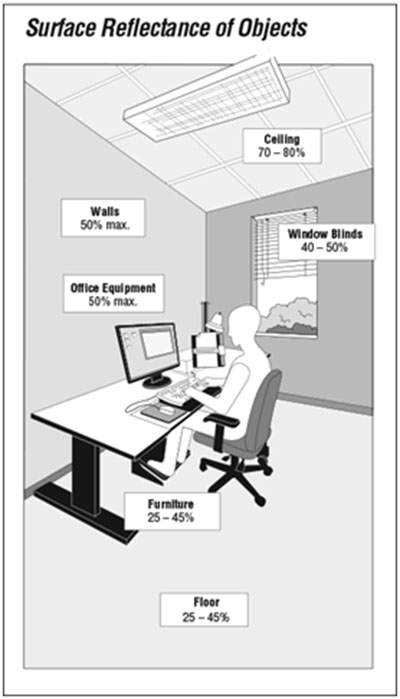LIGHTING ERGONOMICS
The use of computers amongst office workers has increased markedly over the past two decades. This has resulted in an increase in health disorders associated with computer use, the most common of which are eye and vision problems. While eye health problems related to computer use are usually temporary, they cause significant discomfort to computer users and are largely preventable.
Specific impact of poor lighting across industries can be significant.
How do you test and correct for insufficient light problems?
To detect insufficient light, try the following:
How much light is needed for various situations or activities?
The amount of light we need varies and depends on:
The amount of light falling on a surface is measured in units called lux. Depending on the factors noted above, adequate general lighting is usually between 500 and 1000 lux when measured 76 cm (30 inches) above the floor.*
Examples of industrial and office tasks and the recommended light levels are in the table below.
Table
Recommended Illumination Levels*
|
|
Type of Activity
|
Ranges of Illuminations (Lux)**
|
|
Public spaces with dark surroundings
|
20-50
|
|
Simple orientation for short temporary visits
|
50-100
|
|
Working spaces where visual tasks are only occasionally
performed
|
100-200
|
|
Performance of visual tasks of high contrast or large scale
|
200-500
|
|
Performance of visual tasks of medium contrast or small size
|
500-1000
|
|
Performance of visual tasks of low contrast or very small
size
|
1000-2000
|
|
Performance of visual tasks of low contrast and very small
size over a prolonged period
|
2000-5000
|
|
Performance of very prolonged and exacting visual tasks
|
5000-10000
|
* From: IESNA Lighting Handbook. 9th ed. Illuminating Engineering Society of North America, 2000. p. 10-13.
**Lux = Lumens (quantity of light) per square metre.
To reach proper light levels and uniform light distribution in the visual environment, many light fixtures are designed to reflect light off walls, ceilings and objects. The amount of light reflected off a surface can be measured. Suggestions for the percent of light reflected off surfaces in a typical office include:
The percent value refers to the amount of light that a surface reflects relative to the amount that falls on the surface.
To correct insufficient light:

For More Detail Contact Us.